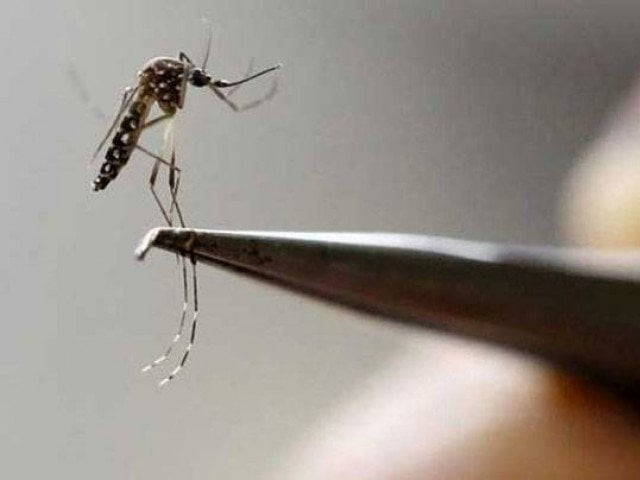Dengue Drama
Experts tell us that our country is undergoing one of its worst-ever dengue fever epidemics

PHOTO: AFP
While there is no independent way to verify this number, what we know is that possibly 2019 will be remembered in Pakistan as the Year of Dengue.
Experts tell us that our country is undergoing one of its worst-ever dengue fever epidemics, recording about 20,000 cases and 34 confirmed deaths in recent months. The disease has hit urban areas of Pakistan, including Islamabad, placing hospitals countrywide under severe strain.
We are told that the relevant authorities are conducting anti-mosquito spraying in urban areas to contain the spread of disease. But there is little evidence of this.
Prolonged monsoon rains have been blamed for the outbreak, whereas the opposition has accused the government of not taking timely measures to prevent it.
As we know, dengue is a mosquito-borne viral infection that causes a severe flu-like illness and sometimes causes a potentially lethal complication called severe dengue. Health experts say that it is prevalent in poor areas, city suburbs and the countryside.
Authorities are struggling to cope with the sudden rise in numbers and are at a loss on what to do. It is believed that at least 250 people have already died of dengue in different parts of the country over the past few weeks. The twin cities of Rawalpindi and Islamabad are the worst-hit.
Thousands of people in the twin cities have tested positive for the virus recently. So far, at least 35 deaths from the dengue virus in Rawalpindi and Islamabad have been confirmed. Reports suggest that as of last week, 750 dengue patients were currently undergoing treatment at different hospitals in the twin cities.
In Karachi, authorities have issued a high alert to district administrations and municipalities to help combat the dengue outbreak in the metropolis. Public and private sector hospitals in Karachi have been receiving a growing number of high-grade fever cases daily and many of them are being tested positive for dengue.
As per official data, over 1,100 dengue cases have been reported in the Quaid’s city in October alone. Dozens of residents in North Nazimabad’s Block F have fallen ill due to dengue, including many students of a local madrassah. North Nazimabad is a dengue hotspot along with Garden East, Union Council 4 of Metroville, Clifton Cantonment Board and Soldier Bazaar according to an official of Sindh’s Dengue Control Programme.
In comparison, 5,005 dengue cases have been reported from across Khyber Pakhtunkhwa so far this year according to the Dengue Response Unit (DRU). 143 dengue patients are being treated at various hospitals in Peshawar.
Dubbed “breakbone fever”, dengue is one of the world’s leading mosquito-borne illnesses and infects tens of millions across the globe annually.
The government has responded in various ways. As the dengue virus continued to take its toll across Punjab, the Toba Tek Singh deputy commissioner came up with an amazing response: a prayer.
According to a poster, the deputy commissioner advised people to read the ‘dua’ daily and paste the pamphlet outside their houses and workplace to ward off the evil dengue.
Not to be outdone, the federal government has decided to hold an investigation into the outspread of dengue with the help of the international organisations. Health authorities will seek the assistance of the World Health Organization (WHO), Centers for Disease Control and Prevention (CDC) of the United States (US) and Sri Lanka. International experts will visit affected areas in all provinces and Azad Jammu and Kashmir (AJK) to open research on dengue larvae and its virus to ascertain the cause of the mosquito-borne disease.
People have also been penalised under the ‘dengue act’ after the determination of places apt for dengue to breed and multiply. Action was taken in areas of Islamabad last week and those found involved in negligence were fined up to Rs30,000 as a penalty.
These are just a drop in the ocean. Without making any comparisons, much more needs to be done to fight dengue. We are not seeing any awareness drive, neither are there mass fumigation campaigns. This is where we need to begin.
Published in The Express Tribune, October 14th, 2019.
Like Opinion & Editorial on Facebook, follow @ETOpEd on Twitter to receive all updates on all our daily pieces.















COMMENTS
Comments are moderated and generally will be posted if they are on-topic and not abusive.
For more information, please see our Comments FAQ